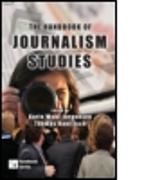Read more
Zusatztext Contributors to The handbook of journalism studies should be congratulated. They have brought together a text that maps the "key theoretical and empirical traditions! fi elds of inquiry and scholarly debates in journalism studies". This is not a how-to-do journalism text. Rather! it is a scholarly reference book that provides an overarching schema for thinking about and investigating issues relating to journalism - past! present and future...It is an essential reference for journalism academics and students." -- Rhonda Breit! Australian Journalism Review 31 (1) Informationen zum Autor Karin Wahl-Jorgensen is Reader in the Cardiff School of Journalism! Media! and Cultural Studies! Cardiff University! Wales. Her work on media! democracy! and citizenship has been published in more than 20 international journals as well as in numerous books.Thomas Hanitzsch is Assistant Professor in the Institute of Mass Communication and Media Research at the University of Zurich. He founded the ICA's Journalism Studies Division and has published four books and more than 50 articles and chapters on journalism! comparative communication research! online media and war coverage. Zusammenfassung This Handbook charts the growing area of journalism studies! exploring the current state of theory and setting an agenda for future research in an international context. The volume is structured around theoretical and empirical approaches! and covers scholarship on news production and organizations; news content; journalism and society; and journalism in a global context. Emphasizing comparative and global perspectives! each chapter explores: Key elements! thinkers! and textsHistorical contextCurrent state of the artMethodological issuesMerits and advantages of the approach/area of studies Limitations and critical issues of the approach/area of studies Directions for future researchOffering broad international coverage from top-tier contributors! this volume ranks among the first publications to serve as a comprehensive resource addressing theory and scholarship in journalism studies. As such! the Handbook of Journalism Studies is a must-have resource for scholars and graduate students working in journalism! media studies! and communication around the globe. Inhaltsverzeichnis Part I: Introducing Journalism Studies1 Introduction : On why and how we should do journalism studiesKarin Wahl-Jorgensen & Thomas Hanitzsch2 Journalism HistoryKevin G. Barnhurst & John Nerone3 Journalism and the AcademyBarbie Zelizer4 Journalism EducationBeate JosephiPart II: News Production5 News Organizations and RoutinesLee B. Becker & Tudor Vlad6 Journalists as GatekeepersPamela J. Shoemaker! Tim P. Vos & Stephen D. Reese7 Objectivity! Professionalism! and Truth Seeking in JournalismMichael Schudson & Chris Anderson8 Reporters and Their Sources Daniel A. Berkowitz9 Gender in the NewsroomLinda Steiner10 Convergence and Cross-Platform Content ProductionThorsten Quandt & Jane SingerPart III: News Content11 Agenda Setting Renita Coleman! Maxwell McCombs! Donald Shaw & David Weaver12 News Values and SelectivityDeirdre O'Neill & Tony Harcup13 Nature! Sources and Effects of News FramingRobert M. Entman! Jörg Matthes & Lynn Pellicano14 News! Discourse and IdeologyTeun A. van Dijk15 Rethinking News and Myth as StorytellingS. Elizabeth Bird & Robert W. Dardenne16 The Commercialization of NewsJohn McManusPart IV: Journalism and Society17 Journalism and DemocracyBrian McNair18 Journalism! Public Relations and SpinDavid Miller & William Dinan19 Alternative and Citizen JournalismChris Atton20 Journalism Law and RegulationKyu Ho Youm21 Journalism EthicsStephen J. A. Ward22 Journalism and Popular CultureJohn Hartley23 Audience Reception and News in Everyday LifeMirca MadianouPart V: Journalism Studies in a Global Context24 Journalis...

